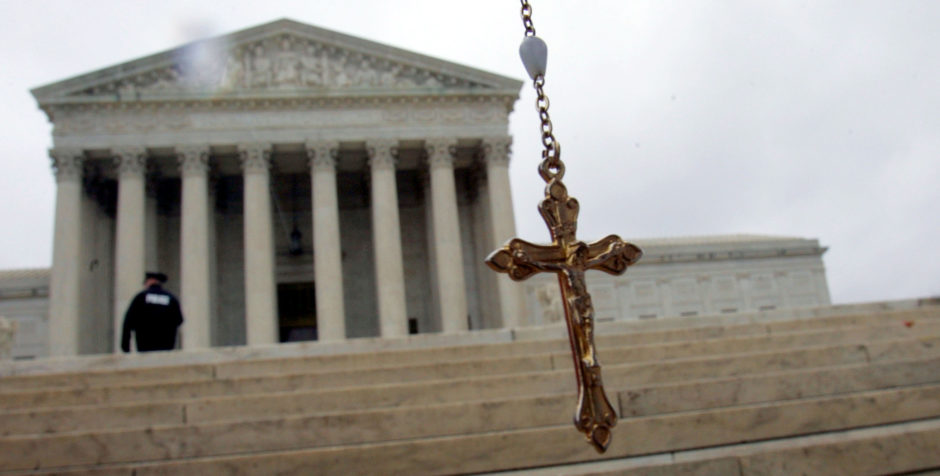Religious Liberty Win: Religious Hospitals Dodge ERISA Bullet at Supreme Court
Even very technical legal issues sometimes can have important implications for the protection of religious freedom for all in the United States. That was the case in a recent Supreme Court ruling over retirement plans.
Religiously affiliated hospital systems won a reprieve from multi-billion dollar liability in a Supreme Court decision issued earlier this week. In Advocate Health Care Network v. Stapleton, the Supreme Court unanimously reversed three lower court decisions that allegedly put such hospitals on the hook for over $60 billion in claims. The American Center for Law and Justice (ACLJ) had filed as friend of the court in support of the hospital systems.
The case mainly focused upon dry questions of statutory interpretation under an even drier federal statute, the Employee Retirement Income Security Act (ERISA). Basically, this statute requires affected plans to maintain certain financial reserves in employee retirement plans, follow specified vesting requirements, and provide various disclosures to employees. ERISA consequently imposes very significant costs on employers. But ERISA does not apply to all employers. The statute expressly exempts all government employers, plus a variety of international organizations. And, at issue in this case, ERISA exempts "church plans" from its requirements.
Why does all of this matter to the ACLJ, a religious liberty organization? Well, for one thing, the viability of religiously affiliated hospitals was in question. A wave of lawsuits charged that these hospitals were not exempt "church plans", were thus violating ERISA, and therefore needed to cough up tens of billions of dollars to come into compliance. But what really got our attention was the anti-religious liberty arguments certain groups had been making in the lower courts (and which, it turns out, would be repeated in the Supreme Court).
These groups, specifically the Freedom From Religion Foundation (FFRF) and the ACLU, contended that an exception for church plans would be unconstitutional in violation of the Establishment Clause. In other words, these groups asserted, an exception for churches and religious organizations or individuals is subject to attack as "favoring religion".
But exceptions are frequently put into laws to recognize both freedom of conscience (as with military draft exemptions for religious pacifists or conscience exemptions for abortion), the autonomy of churches (as with exceptions allowing religious ministries to hire according to their principles of faith and morals, e.g., letting synagogues insist that the rabbi be Jewish, or letting a diocese insist that a Catholic hospital chaplain oppose euthanasia), and the social value of churches (as with tax exemptions for houses of worship). As we stated in our amicus brief:
The religious protection embodied in the First Amendment leaves ample room for exemptions that accommodate religious persons, practices, and institutions beyond the bare minimum which the Free Exercise Clause requires. Offering a buffer of protection to religion in this way is not unconstitutional favoritism. Rather, it is the American way.
Yet FFRF and the ACLU were challenging that tradition of protecting religion. We had to respond. As we explained in our brief, the ERISA exception fell comfortably within the national norm of safeguarding religious practice:
“‘Neutrality’ in matters of religion is not inconsistent with ‘benevolence’ by way of exemptions from onerous duties,” Gillette v. United States, 401 U.S. 437, 454 (1971). The ERISA church plan exemption spares religious employers from massive financial and other burdens, falling squarely within [this] statement. . . . [Moreover,] this Court has again and again upheld various exemptions that protect – or “benefit,” in FFRF’s loaded phrasing – religious entities: tax exemptions . . . ; exemptions from employment discrimination laws . . . ; and [enhanced protection against] substantial burdens on religious exercise . . . .
This was especially true given the fact that ERISA already excluded government employees from its reach. As we noted:
[T]he burden on employees of church plan employers is no different than that faced by the millions of government employees whose employers are also exempt under ERISA. ERISA contains an exception for “a governmental plan,” . . . the definition of which includes plans covering federal, state, and local government employees. . . . It is hard to see how a burden on all these employees could be perfectly acceptable as a policy matter, yet somehow become a constitutional crisis when applied to religious healthcare.
In the end, the Supreme Court did not even give the time of day to the FFRF/ACLU contentions. In an opinion for a unanimous Court, Justice Elena Kagan ruled that the religious hospitals "have the better of the argument" over whether ERISA's "church plan" exemption applied to entities that are religiously affiliated. That decision reversed three lower court rulings that had gone against the hospital systems. And the Court did not suggest that it saw even the slightest problem with the notion of an exception for church plans in the first place – which is a very good thing and a significant victory for religious freedom.
